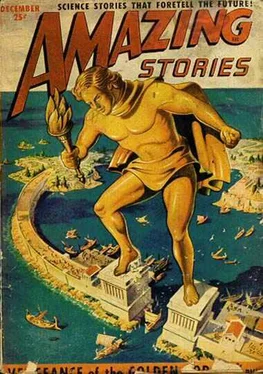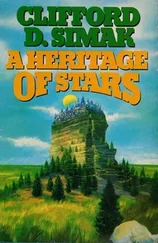Clifford Simak - Skirmish
Здесь есть возможность читать онлайн «Clifford Simak - Skirmish» весь текст электронной книги совершенно бесплатно (целиком полную версию без сокращений). В некоторых случаях можно слушать аудио, скачать через торрент в формате fb2 и присутствует краткое содержание. Год выпуска: 1950, Издательство: Ziff-Davis Publishing Company, Жанр: Фантастика и фэнтези, на английском языке. Описание произведения, (предисловие) а так же отзывы посетителей доступны на портале библиотеки ЛибКат.
- Название:Skirmish
- Автор:
- Издательство:Ziff-Davis Publishing Company
- Жанр:
- Год:1950
- ISBN:нет данных
- Рейтинг книги:5 / 5. Голосов: 1
-
Избранное:Добавить в избранное
- Отзывы:
-
Ваша оценка:
- 100
- 1
- 2
- 3
- 4
- 5
Skirmish: краткое содержание, описание и аннотация
Предлагаем к чтению аннотацию, описание, краткое содержание или предисловие (зависит от того, что написал сам автор книги «Skirmish»). Если вы не нашли необходимую информацию о книге — напишите в комментариях, мы постараемся отыскать её.
Skirmish — читать онлайн бесплатно полную книгу (весь текст) целиком
Ниже представлен текст книги, разбитый по страницам. Система сохранения места последней прочитанной страницы, позволяет с удобством читать онлайн бесплатно книгу «Skirmish», без необходимости каждый раз заново искать на чём Вы остановились. Поставьте закладку, и сможете в любой момент перейти на страницу, на которой закончили чтение.
Интервал:
Закладка:
Skirmish
by
CLIFFORD SIMAK
It was a good watch. It had been a good watch for more than thirty years. His father had owned it first, and his mother had saved it for him after his father died and had given it to him on his eighteenth birthday. For all the years since then it had served him faithfully.
But now, comparing it with the clock on the newsroom wall, looking from his wrist to the big face of the clock over the coat cabinets, Joe Crane was forced to admit that his watch was wrong. It was an hour fast. His watch said seven o’clock and the clock on the wall insisted it was only six.
Come to think of it, it had seemed unusually dark driving down to work, and the streets had appeared singularly deserted.
He stood quietly in the empty newsroom, listening to the muttering of the row of teletype machines. Overhead lights shone here and there, gleaming on waiting telephones, on typewriters, on the china whiteness of the pastepots huddled in a group on the copy desk.
Quiet now, he thought, quiet and peace and shadows, but in another hour the place would spring to life. Ed Lane, the news editor, would arrive at six-thirty, and shortly after that Frank McKay, the city editor, would come lumbering in.
Crane put up a hand and rubbed his eyes. He could have used that extra hour of sleep. He could have -
Wait a minute! He had not got up by the watch upon his wrist. The alarm clock had awakened him. And that meant the alarm clock was an hour fast, too.
‘It don’t make sense,’ said Crane, aloud.
He shuffled past the copy desk, heading for his chair and typewriter. Something moved on the desk alongside the typewriter — a thing that glinted, rat-sized and shiny and with a certain undefinable manner about it that made him stop short in his tracks with a sense of gulping emptiness in his throat and belly.
The thing squatted beside the typewriter and stared across the room at him. There was no sign of eyes, no hint of face, and yet he knew it stared.
Acting almost instinctively, Crane reached out and grabbed a pastepot off the copy desk. He hurled it with a vicious motion and it became a white blur in the lamplight, spinning end over end. It caught the staring thing squarely, lifted it, and swept it off the desk. The pastepot hit the floor and broke, scattering broken shards and oozy gobs of half-dried paste.
The shining thing hit the floor somersaulting. Its feet made metallic sounds as it righted itself and dashed across the floor.
Crane’s hand scooped up a spike, heavily weighted with metal. He threw it with a sudden gush of hatred and revulsion. The spike hit the floor with a thud ahead of the running thing and drove its point deep into the wood.
The metal rat made splinters fly as it changed its course. Desperately it flung itself through the three-inch opening of a supply cabinet door.
Crane sprinted swiftly, hit the door with both his hands, and slammed it shut.
‘Got you,’ he said.
He thought about it, standing with his back against the door.
Scared, he thought. Scared silly by a shining thing that looked something like a rat. Maybe it was a rat, a white rat.
And, yet, it hadn’t had a tail. It didn’t have a face. Yet it had looked at him.
Crazy, he said. Crane, you’re going nuts.
It didn’t quite make sense. It didn’t fit into this morning of 18 October 1962. Nor into the twentieth century. Nor into normal human life.
He turned around, grasped the doorknob firmly, and wrenched, intending to throw it wide open in one sudden jerk. But the knob slid beneath his fingers and would not move, and the door stayed shut.
Locked, thought Crane. The lock snapped home when I slammed the door. And I haven’t got the key. Dorothy Graham has the key, but she always leaves the door open because it’s hard to get it open once it’s locked. She almost always has to call one of the janitors. Maybe there’s some of the maintenance men around. Maybe I should hunt one up and tell him -
Tell him what? Tell him I saw a metal rat run into the cabinet? Tell him I threw a pastepot at it and knocked it off the desk? That I threw a spike at it, too, and to prove it, there’s the spike sticking in the floor?
Crane shook his head.
He walked over to the spike and yanked it from the floor. He put the spike back on the copy desk and kicked the fragments of the pastepot out of sight.
At his own desk, he selected three sheets of paper and rolled them into the typewriter.
The machine started to type. All by itself without his touching it! He sat stupefied and watched its keys go up and down. It typed: Keep out of this, Joe, don’t mix into this. You might get hurt.
Joe Crane pulled the sheets of copy paper out of the machine. He balled them in his fist and threw them into a waste-basket. Then he went out to get a cup of coffee.
‘You know, Louie,’ he said to the man behind the counter, ‘a man lives alone too long and he gets to seeing things.’
‘Yeah,’ said Louie. ‘Me, I’d go nuts in that place of yours. Rattling around in it empty-like. Should have sold it when your old lady passed on.’
‘Couldn’t,’ said Crane. ‘It’s been my home too long.’
‘Ought to get married off, then,’ said Louie. ‘Ain’t good to live by yourself.’
‘Too late now,’ Crane told him. ‘There isn’t anyone who would put up with me.’
‘I got a bottle hid out,’ said Louie. ‘Couldn’t give you none across the counter, but I could put some in your coffee.’
Crane shook his head. ‘Got a hard day coming up.’
‘You sure? I won’t charge you for it. Just old friends.’
‘No. Thank you, Louie.’
‘You been seeing things?’ asked Louie in a questioning voice.
‘Seeing things?’
‘Yeah. You said a man lives too much alone and he gets to seeing things.’
‘Just a figure of speech,’ said Crane.
He finished the cup of coffee quickly and went back to the office.
The place looked more familiar now. Ed Lane was there, cussing out a copy boy. Frank McKay was clipping the opposition morning sheet. A couple of other reporters had drifted in.
Crane took a quick look at the supply cabinet door. It was still shut.
The phone on McKay’s desk buzzed and the city editor picked it up. He listened for a moment, then took it down from his ear and held his hand over the mouthpiece.
‘Joe,’ he said, ‘take this. Some screwball claims he met a sewing machine coming down the street.’
Crane reached for his phone. ‘Give me the call on 245,’ he told the operator.
A voice was saying in his ear. ‘This is the Herald? This is the Herald? Hello, there…’
‘This is Crane,’ said Joe.
‘I want the Herald,’ said the man. ‘I want to tell ‘em…’
‘This is Crane of the Herald,’ Crane told him. ‘What’s on your mind?’
‘You a reporter?’
‘Yeah, I’m a reporter.’
‘Then listen close. I’ll try to tell this slow and easy and just the way it happened. I was walking down the street, see…’
‘What street?’ asked Crane. ‘And what is your name?’
‘East Lake,’ said the caller. ‘The five- or six-hundred block. I don’t remember which. And I met this sewing machine rolling along the street and I thought, thinking the way you would, you know, if you met a sewing machine — I thought somebody had been rolling it along and it had gotten away from them. Although that is funny, because the street is level. There’s no grade to it at all, you see. Sure, you know the place. Level as the palm of your hand. And there wasn’t a soul in sight. It was early morning, see …’
‘What’s your name?’ asked Crane.
Читать дальшеИнтервал:
Закладка:
Похожие книги на «Skirmish»
Представляем Вашему вниманию похожие книги на «Skirmish» списком для выбора. Мы отобрали схожую по названию и смыслу литературу в надежде предоставить читателям больше вариантов отыскать новые, интересные, ещё непрочитанные произведения.
Обсуждение, отзывы о книге «Skirmish» и просто собственные мнения читателей. Оставьте ваши комментарии, напишите, что Вы думаете о произведении, его смысле или главных героях. Укажите что конкретно понравилось, а что нет, и почему Вы так считаете.










